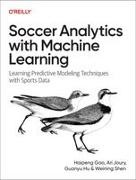Read more
Struggling to grasp machine learning concepts or unsure how to apply them in the real world? This book aims to change that by using the world's most popular game--soccer--to illuminate key concepts in predictive modeling and data science. Whether you're a complete beginner or you're interested in entering the burgeoning field of sports analytics, you'll develop a solid foundation in machine learning through engaging examples that bridge academic principles with practical applications.
Written by experts in both machine learning and sports analytics, this practical Python-focused guide introduces fundamental data science techniques using real soccer data. Ideal for students, analysts, and soccer fans alike, it offers instructions on models and techniques such as logistic regression, random forests, deep learning, simulations, and feature engineering. But instead of memorizing algorithms, you'll learn by building predictive models to analyze match outcomes, test betting strategies, run simulated game scenarios, and more.
- Understand machine learning concepts by working with real sports data
- Develop, refine, and evaluate machine learning models, using Python for data analysis
- Carry out detailed analyses and research on soccer game predictions and betting strategies to surface valuable insights
- Apply the skills you learn to predictive modeling scenarios in other industries
About the author
Dr. Haipeng Gao is a machine learning expert with extensive industry experience, having held machine learning roles at multiple leading tech companies spanning several core business domains, including Ads, Trust, Risk, and CRM. In addition, Dr. Gao has taught Statistics and Probability at the University of North Carolina at Chapel Hill and San Jose State University. This combination of industry experience and academic services gives Dr. Gao unique insights into both the theoretical foundations and practical applications of machine learning and data science. Dr. Gao holds a Ph.D. in Statistics and Operations Research from the University of North Carolina at Chapel Hill.

